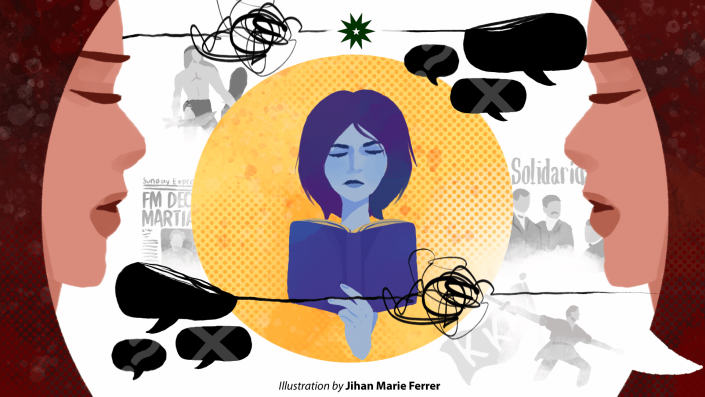“History is like tsismis.”
(Gossip.)
In one horribly misinformed statement promoting her upcoming “historical” film, actress Ella Cruz effectively reduced an ancient, rigorous, and esteemed discipline into an idle pastime. Much has been said by the historical community on the distinction between the discipline of history and gossip, whether historical truth is relative or if there is a place in historical discourse for stories of individuals and the rumors surrounding them. As for myself, a student of history and an arm’s length from earning the recognition of a historian, the statement made me realize one of the great problems when thinking about history.
Almost a century ago, economic historian Francois Simiad referred to a phenomenon he called the “individual idol” or the overemphasis on the stories of “great men”. After all, what is gossip other than the rumors and stories of these larger than life figures. But the study of history goes beyond that. Understanding this is more crucial to nation building than most people like to think.

In the Philippines, the idea that history is condensed into the narratives of a few people stems from the fact that our politics works the same way. Instead of discussing ideologies or policies or anything that affects the country on a broader scale, Philippine politics emphasizes the personalities of politicians, their relationships, families, along with the credit-grabbing game of who-done-whats and whodunits. It’s not far-fetched, then, to imagine that Philippine history is commonly seen in pretty much the same way: a drama where a few families and notable characters duke it out over the centuries, pushing everyone else aside to annoying background characters.
Such a narrow-minded perspective on history keeps us from seeing the big picture. The sum of Philippine history is not simply the story of a few powerful families or an assortment of larger-than-life figures who had the ability to leave their names in the records. It is the sum total of the stories of all of us, even the lesser known and the nameless.
It isn’t just the story of that drawn-out feud between the Marcoses and the Aquinos, or of the marvelous misadventures of Jose Rizal and his illustrado friends. It is also the story of the farmers, the ordinary workers, and the indigenous peoples. This isn’t just some far away historical concept, but this also applies to how recent events can be understood. When reflecting on recent events, it’s easy to condense it into the narrative of how one strongman improved an entire country on the force of its own will when it should be considered that it takes a whole society to move a country. Disregarding the efforts and stories of many people can lead to credit grabbing by the unscrupulous few.
In the words of French historian Jules Michelet, a history from below is “of those who have suffered, worked, declined and died without being able to describe their sufferings.” It is our collective memory. Thus, it should serve the whole country, not a select group of powerful individuals.
As history is the Filipino people’s collective memory, it should not just be a collection of trivia facts and spicy gossip about so-and-so historical figures. It should also be a wellspring that reflects how we developed as a nation. Why is our culture as it is, why are there still rampant injustices and how to solve them, and where are we now and where to go from here. In the same way that a person looks back on their life to figure what to do next, the nation must draw lessons from its past if it wants to navigate the murky waters of the future.
After all, as the old Tagalog proverb goes: “Ang hindi marunong lumingon sa pinanggalingan ay hindi makakarating sa paroroonan.”
(One who does not look back on where they came from will not arrive at their destination.)
If one were to look at history as just the stories of great men, it is easy to feel helpless. One can easily believe that only someone as brilliant as Rizal can move the cogs of history. But if thought of as a memory that involves everyone, history is empowering. It reminds us that we have a duty to work toward the future we want today, just as our ancestors themselves had moved toward the present day, and that we can do it together as a society. This is at the core of why truth-telling is important in the storytelling of history. One cannot learn from lies, opinions, and gossip. One will only be deceived.
From an illusory past derives an illusory future. And a future that does not exist is not a place that this country can afford to be in.
